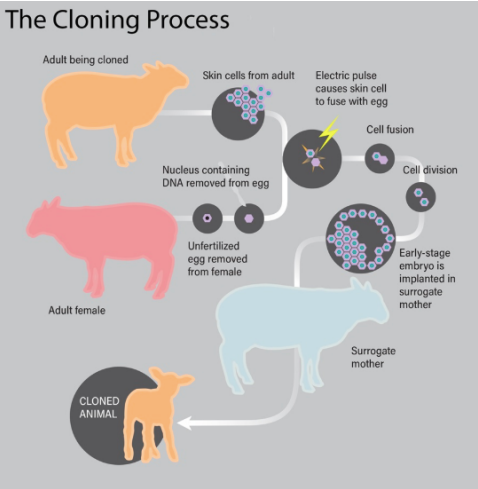Definition Of Organism Cloning
Cloning vectors are utilized to insert foreign DNA into another cell and create multiple copies of the same. Cloning the process of generating a genetically identical copy of a cell or an organism.
This can involve the ranges of a cell nuclear in which the nucleus is removed from an egg cell and replaced with a nucleus extracted from a cell of the organism to be cloned.

Definition of organism cloning. Cloning in American English. Modern genetic technology can also be used to create clones. It amplifies one copy of DNA into multiple copies.
Genes cells tissues and even whole animals can all be cloned. Cloningof livestock 1 is a means of replicating an existing favorable combination of traits such as efficient growth and high milk production without the genetic lottery and mixing that occur in sexual reproduction. Researchers have cloned a wide range of biological materials including genes cells tissues and even entire organisms such as a sheep.
Cloning is the production of a population of genetically identical cells or of organisms asexually produced by a single cell or organism. When most people think of cloning they usually think of Dolly the sheep who in 1996 became the first mammal to be cloned from an adult cell 2. Therapeutic cloning enables the cultivation of stem cells that are genetically identical to a patient.
Single-celled organisms like bacteria make exact copies of themselves each time they reproduce. Organism Cloning - Web Books Publishing. Each newly produced individual is a clone of the original.
When a copy is made of someones DNA and genetic makeup this is an example of cloning. Unfortunately Dolly didnt live to a ripe old age but her birth was an achievement and scientists have learned a lot through the process. The technique of producing a genetically identical duplicate of an organism by replacing the nucleus of an unfertilized ovum with the nucleus of a body cell from the organism.
Cloning animals is a reliable way of reproducing superior livestock genetics and ensuring herds are maintained at the highest quality possible. In humans identical twins are similar to clones. Cloning an organism is to create a new organism with the same genetic information as an existing one.
Breeding selected organisms for their desired traits has been going on for thousands of years. Websters New World College Dictionary 4th Edition. In essence this form of cloning is an asexual method of reproduction where fertilization or contact between gametes does not take place.
Cloning is a technique scientists use to make exact genetic copies of living things. The definition of cloning is the technique of making an identical copy of something. Its important to remember that cloning does not manipulate the animals genetic make up nor change an animals DNA.
Through the process of asexual reproduction organisms such as bacteria and some plants create offspring that are genetically identical to the parent. Cloning happens often in naturefor example when a cell replicates itself asexually without any genetic alteration or recombination. Reproductive cloning is defined as the deliberate production of genetically identical individuals.
Prokaryotic organisms organisms lacking a cell nucleus such as bacteria create genetically identical duplicates of themselves using binary fission or budding. Monozygotic identical twins are natural clones. Some clones already exist in nature.
Cloning A clone is a genetically identical copy of an organism and it may be naturally occurring or created in the lab. The foreign DNA is duplicated and expressed utilizing the host cell machinery. Cloning is fundamental to most living things since the body cells of plants and animals are clones that come from a single fertilized egg.
The copied material which has the same genetic makeup as the original is referred to as a clone. Organism cloning also called reproductive cloning refers to the process of creating a new multicellular organism genetically identical to another. Therapeutic cloning is intended to use cloned embryos for the purpose of extracting stem cells from them without ever implanting the embryos in a womb.
It is the process of making of copy of any organism and in which the genotypic and phenotypic character of the new organism remained exactly same as that of parental organism is called.

Cloning Technique What Is Cloning Cloning Is A

Op Ed The Dangers Of Cloning Fung Institute For Engineering Leadership

Cloning And Stem Cells Biological Principles

What Is Human Cloning Definition Pros Cons Video Lesson Transcript Study Com
Difference Between Cloning And Genetic Engineering Definition Types Process Role And Differences

Cloning Is Cloning Is Cloning Charlotte Lozier Institute

What Is Human Cloning Definition Pros Cons Video Lesson Transcript Study Com

5d Cloning Define Clone Clone A Group Of Genetically Identical Organisms Or A Group Of Cells Derived From A Single Parent Cell Ppt Download

Therapeutic Cloning An Overview Sciencedirect Topics

Reproductive Cloning Islamic Views On Creation Of An Identical Copy Of An Organism Ethics 1 9 Abu Khadeejah أبو خديجة

Cloning Animals An Overview Sciencedirect Topics

Cloning National Geographic Society

Artificial Cloning Of Domestic Animals Pnas






Post a Comment for "Definition Of Organism Cloning"